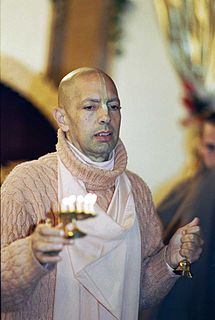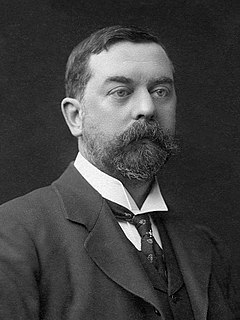A Quote by George Harrison
Krishna is God, so He's absolute: His name, His form, prasadam, it's all Him.
Related Quotes
I've always enjoyed prasadam much more when I've been at the temple, or when I've actually been sitting with Prabhupada, than when somebody's brought it to me. Sometimes you can sit there with prasadam and find that three or four hours have gone by and you didn't even know it. Prasadam really helped me a lot, because you start to realize "Now I'm tasting Krishna."
When we awaken the love for God, that love naturally extends toward every living being. Also, the concept of Krishna and Radha, the masculine and feminine aspect of the one supreme God, was so inclusive that it touched my heart. So when Prabhupada came, I was already following his path. But it was when I saw his compassion, concern and deep wisdom, that I accepted him as my guru and decided to try and assist him. I felt that was where my real home was.
Mankind occurs as male or female, as something or nothing. Woman has no share in ontological reality, no relation to the thing-in-itself, which, in the deepest interpretation, is the absolute, is God. Man in his highest form, the genius, has such a relation, and for him the absolute is either the conception of the highest worth of existence, in which case he is a philosopher; or it is the wonderful fairyland of dreams, the kingdom of absolute beauty, and then he is an artist.
When I say that "l see God," I don't necessarily mean to say that when I chant I'm seeing Krishna in His original form when He came five thousand years ago, dancing across the water, playing His flute. Of course, that would also be nice, and it's quite possible too. When you become real pure by chanting, you can actually see God like that, I mean personally. But no doubt you can feel His presence and know that He's there when you're chanting.
My grandfather is from Ireland. His name is Florence McCarthy. He moved to New York in 1920. They used to beat him up because his name was Florence. He had to switch his name to Frank. And then this Christmas, he made an announcement - he goes, 'I'm switching me name back to Florence.' And we beat him up, 'cause it's a dumb name and he's old and weak and it was easy.
A truly humble man is sensible of his natural distance from God; of his dependence on Him; of the insufficiency of his own power and wisdom; and that it is by God's power that he is upheld and provided for, and that he needs God's wisdom to lead and guide him, and His might to enable him to do what he ought to do for Him.
Children, we should consider every name as the name of our beloved deity. Imagine that He is the one that appears in all the different forms. If our beloved deity is Krishna, then while chanting the names of the Divine Mother, imagine that Krishna has come before us as Devi. We should not think that since we are chanting Devi's names, Krishna might not like it. These differences exist only in our world, not in His.
At this day . . . the earth sustains on her bosom many monster minds, minds which are not afraid to employ the seed of Deity deposited in human nature as a means of suppressing the name of God. Can anything be more detestable than this madness in man, who, finding God a hundred times both in his body and his soul, makes his excellence in this respect a pretext for denying that there is a God? He will not say that chance has made him different from the brutes; . . . but, substituting Nature as the architect of the universe, he suppresses the name of God.
'Impressionism' was the name given to a certain form of observation when Monet, not content with using his eyes to see what things were or what they looked like as everybody had done before him, turned his attention to noting what took place on his own retina (as an oculist would test his own vision).
Impressionism' was the name given to a certain form of observation when Monet, not content with using his eyes to see what things were or what they looked like as everybody had done before him, turned his attention to noting what took place on his own retina (as an oculist would test his own vision).































